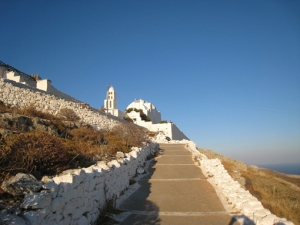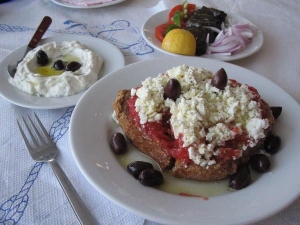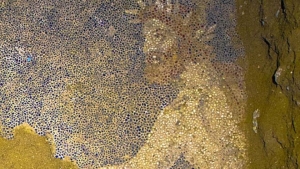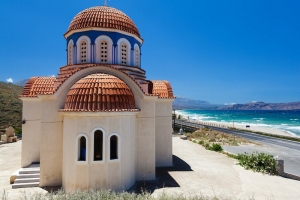XpatAthens
Greece Breaks One Renewable Energy Record After Another
The operation of the system with 68 percent participation of the RES is a great performance for today, but, will be the rule in a few years as the target for 2030 is 67 percent of the electricity to derive from renewable energy sources.
As Independent Power Transmission Operator (ADMIE) president and CEO said at the Delphi Economic Forum “The major storage works are necessary in order to maximize the benefits of the green energy and in parallel preserving the stability of the electricity system”.
Meanwhile, a week ago at the Delphi forum, the Greek tourism ministry and Google announced on Friday a new partnership for the acceleration of a green and sustainable transformation of the Greek tourism industry. The collaboration includes the creation of a new training program for small and medium-sized tourism enterprises, in collaboration with the Global Sustainable Tourism Council (GSTC).
The American company also announced one million dollars in funding from Google.org to support organizations that help social enterprises in Greece, with an emphasis on sustainability and ecotourism.
The transition of the Greek tourism industry to a more sustainable and environmentally-friendly growth model is a key priority in dealing with the inevitable consequences of the climate crisis.
According to a new survey conducted by the Institute for Tourism Research and Forecasting (ITEP) on behalf of Google and the Hotel Chamber of Greece, three out of four hotel owners consider the implementation of sustainability practices crucial for the future of their business, with 79%t expressing interest in obtaining sustainability certification. However, only 41% consider their level of knowledge about sustainability practices to be satisfactory.
Originally published on: greekcitytimes.com
2nd Full-Day Conference Of The Child & Adolescent Mental Health Initiative
Folegandros: Images of an Undiscovered Gem
Walk along the cobblestone narrow streets of Hóra past white houses with multi-coloured doors and windows, timeless creations of the traditional Cycladic architecture. If you need to take a rest, plane trees will offer you their cool, welcome shade. Wait until the sun sets into the eternal blue of the Aegean and join the locals in the village’s squares. Share with them homemade dishes and local delicacies, such as “matsáta” (handmade noodles with rooster or rabbit), sourotó (white goat cheese), and drink “rakómelo” (raki with honey) the famous spirit of the island. Here you will find most of the island's fine hotels.
• Tour natural and religious sites.
The Church of the Assumption of the Virgin Mary
Towering above Hóra and with a stone path leading to it, a whitewashed impressive church awaits to be discovered. Allegedly built on the site of an ancient temple, the church hosts significant ancient immured inscriptions and statues’ pedestals in its yard and interior. Tradition has it that the silver-plated icon of the Virgin Mary is miraculous. Linked to pirate stories, the icon is carried around the town in a procession held every year on Easter Sunday.
Hiking tip: Follow the rocky path starting from Poúnda square all the way to the church (walking time app. 15 min).
Ano Merá
The picturesque village of Ano Merá is a traditional rural settlement of the 19th century. To learn more about the traditional everyday life of Folégandros, visit the Folk Art Museum (open from 17:00 to 20:00 in the summer).
Chrysospiliá
Chrysospiliá is a natural monument of great interest, and not just to archaeologists and speleologists. Situated below the monastery of the Virgin Mary on a rocky beach at 30m above sea level with impressive stalactites and stalagmites, the cave is globally unique for the ancient male Greek names written on its walls and roof, dated back to the 4th century BC. Nicagoras, Themistocles, Cleon, Callimachus, Pythagoras, and Lysicrates are some of the names carved on the cave walls. According to some theories, the cave was used as a worship site where ceremonies for young men coming of age used to take place.
Important info: Accessible only by the sea, the cave is temporarily unavailable for visitors due to archaeological research in progress.
• Head to the island's pristine beaches.
This small island in the Cyclades is full of pebbly beaches covered with tamarisk trees. The scenic harbour of Karavostássis with its beautiful beach is the perfect starting point for an exploration of the glorious beaches of Hohlídia, Vitzétzo, Latináki, Pountáki and Livádi, a village with a sandy beach, turquoise waters and a camping site. Those of you, who don't feel like walking, can take a caique from Karavostássis to Kátergo, the most beautiful beach on the island, with thin pebbles and crystal-clear waters. Sheer cliff drops and azure waters embrace Agali beach to the west of the island. A trail from here will take you to the clothing-optional beach of Ayios Nikólaos, where a small taverna with delicious food and a marvelous view awaits you. In the northeastern part of the island lie the beaches of Voriná, with green stones peculiar-to-Folégandros, Ayios Geórgios and Serfiótiko, accessible only by caique or on foot.
• Taste culinary delights and local wine:
Matsáta: handmade noodles with rooster or rabbit
Sourotó: white goat cheese
Kalassoúna: cheese pie made with sourotó and onions
Cooked caper
Baked chickpeas
Karpouzénia: a local sweet made of fried watermelon (in Greek watermelon means “karpouzi”)
Sesame bars
White and red wine
Source: Visitgreece.gr
What To Look For In A Great Greek Restaurant
What’s on the menu
Greek restaurants outside Greece tend to serve either well-known dishes like moussaka and baklava, or the very health-conscious Greek dishes like grilled seafood and spare vegetables. There is, however, an entire range of dishes that is under-represented - casserole dishes and thick soups - made from wonderful taste combinations of vegetables, herbs, pastas, lentils and beans. If these are on the menu and are well-prepared, it's a definite bonus!
The ingredients
Fresh is paramount. Greek is paramount. Olive oil, fresh-baked crusty breads, Greek cheeses and wines, fresh fruits and vegetables, lentils and beans, Greek favorites such as oregano, dill, garlic, and lemon will all be represented.
Appetizers and mezethes
A Greek restaurant without a good selection of appetizers or mezethes from which to choose could hardly be called great. Appetizers should whet the appetite, mezethes should complement (but not overwhelm) the beverage, whether wine, spirits, or other drink choice. These small plates of tasty morsels and dips are as much a part of the Greek dining experience as the main meal (and sometimes, adding more and more of these small dishes can become the main meal).
Knowledgeable staff
The restaurant's serving staff doesn't have to be Greek - but of course it adds to the overall atmosphere if it is; however, if the restaurant is truly great, servers - whether professionals (Greek or not) or family members of the owner - are able to describe dishes, recommend combinations of foods, and answer questions. For those who are long-time fans of Greek food, it’s always interesting to hear about regional variations in a dish on the menu; for those with no experience of Greek food, learning about the tradition of mezethes, or a bit of the history of a dish adds enormous enjoyment to a meal. For those on restricted diets, knowledgeable staff is able to direct them to divine dishes that meet their dietary requirements. And if dishes require extra preparation time, servers point that out during the ordering process.
If the restaurant has a sommelier to recommend and present the wines, she/he is knowledgeable about the region of Greece where the wine was made, which wine is traditionally served with which dish, and which wine – despite tradition – might be an even better choice with a particular dish, and why.
Presentation and taste
It smells wonderful, it’s authentic, the ingredients are right, and it has been explained by staff, and now the defining moment is at hand. The food is delivered as ordered. The cheeses and sauces have wonderful textures. Phyllo pastry is light as air. Dishes are cooked to perfection and taste at least as good as they have been described – either on the menu or by the staff.
What Doesn’t Matter
Greek décor
5 Of The Best Campsites In Greece
Here's a small list of some of the best campsites in Greece.
1. Enjoy Lichnos Camping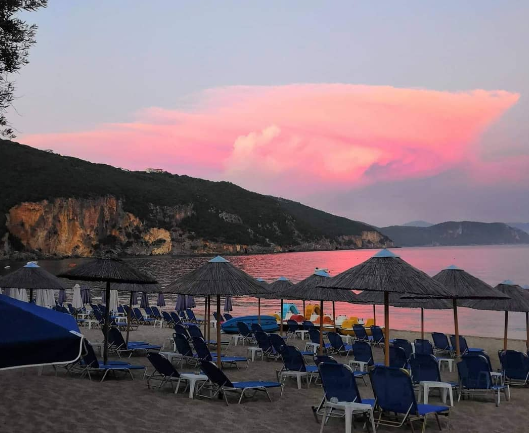
@enjoy_lichnos_bay_village_
Parga is one of the most picturesque villages on the west coast. Its Venetian-influenced buildings huddle together on the hillside, with whitewashed alleyways and bougainvillea tumbling down to the bay. A few miles south, you’ll find Enjoy Lichnos Camping, a welcoming haven set within an olive grove. Pitches are close to the beach in an RV-free meadow. Hire a catamaran or kayak, explore the sea caves or just chill in the friendly alfresco bar. Just half an hour away are the creepy, mythic ruins of the 2,500-year-old Necromantion, the gateway to the underworld.
2. Poros Beach Camping 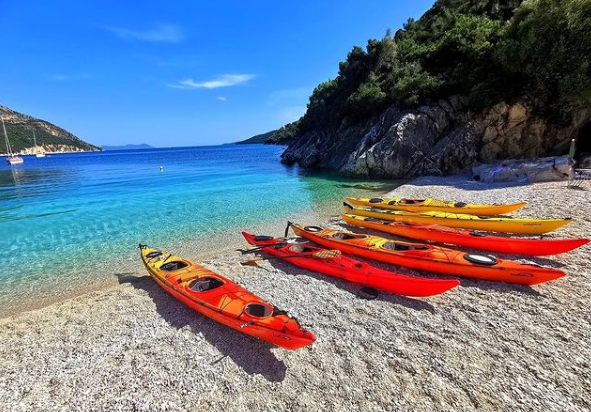
@porosbeach
A snake of road wheels by shady groves, dozing horses, and somnolent villages on its way down to Poros’s fine-pebbled beach. You can relax in the shade of the site’s stylish restaurant, head to the charming little port of Vasiliki for water-side dining, or just flop on the beach, watching the blue horizon compete with the serenity of the turquoise sea.
3. Tartaruga Camping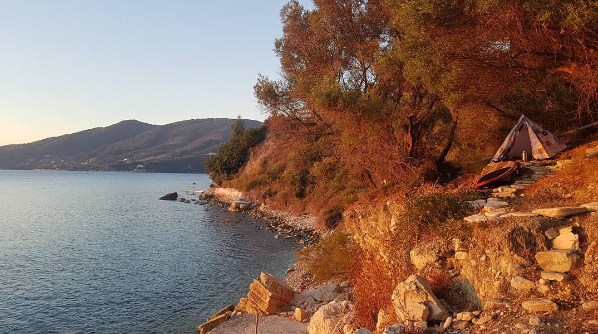
@katemarshallevansartoutdoors
Tartaruga offers one of the most dramatic views of any campsite in Greece; stare down at the epiphany-inducing sea from the giddy heights of its alfresco restaurant, unblemished but for a deserted island and the occasional puttering of a fisherman’s boat. As if to confirm its pedigree, loggerhead turtles have chosen the turquoise waters beside the site as a safe place to mate.
Lounge in the shadow of pines or visit the beach. You’re in the middle of nowhere – but the sense of dramatic escape is much the better for it.
4. Camping Areti 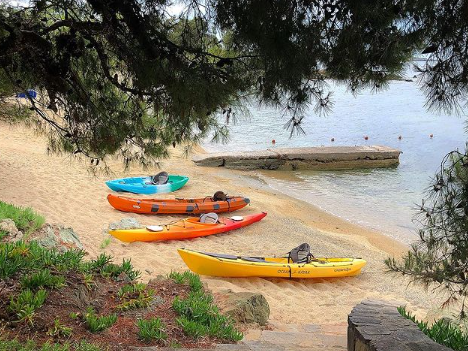
@xeaionescu
Areti sits on acres of eucalyptus and exotic flora. Its tranquil taverna is delightful, as are the many amenities, including a playground and tennis courts. There are hidden recesses, for cheeky romance, and inviting lookout points, for watching the sun go down. You can camp near the sea beside one of two beaches, dramatically screened by gnarled olive trees. On a clear morning, you can see the distant peak of Mount Olympus. For lunch, head to one of the tavernas in Neo Marmaras, an unpretentious market town.
5. Camping Antiparos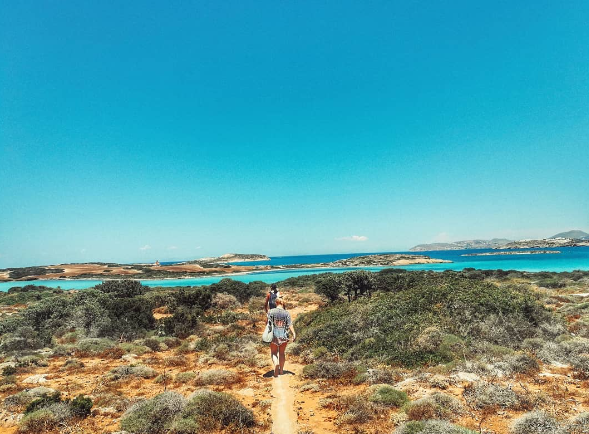
@vskrou
Antiparos is an intimate island just over the water from its larger sibling, Paros. Its harbor feels like a composite of everything Greek, with wrinkled fishermen, ripe fruit spilling from colorful crates, and an azure sky pure enough to melt the heart. No less enchanting is Camping Antiparos, on a rugged headland beside the sea. You can pitch under a tangled canopy of cedars or find a secret spot in the site’s bamboo field. The restaurant is a honey pot of homemade indulgence.
TUI Group Says Greece Still Strong - Sees More Bookings In 2015
Greek Tomb Was For Alexander The Great's Friend Hephaestion
Water Is The Leading Element Of This Year's Navarino Challenge
Unique swimming activities will take place each and every day of the duration (9-11/9) of 'Navarino Challenge' in Costa Navarino and at the outstanding facilities of The Westin Resort Costa Navarino.
Click HERE for this year's event info and registration details.
For more information about Navarino Challenge 2016, please visit: Navarino Challenge
In the hands of their parents, babies come in contact with the water element, get familiar with it and accept all the calming effect under the instructions of qualified personnel by Swim Academy.
Adults and children will also have the opportunity to participate for the first time in the aqua aerobic program. The most popular aerobic exercise comes in “Navarino Challenge” to help you burn calories, keep your body in shape and tone your cardiorespiratory system.
‘Navarino Challenge’ offers water sports lovers the opportunity to enjoy exciting moments under the warm Messinian sun. According to the values of Costa Navarino for sustainable development and our commitment to protect the environment, all water sports are non–motorized, with a wide range available to choose from and enjoy the mild climate of Messinia all seasons with safety above all!
For the third consecutive year ‘Navarino Challenge’ will be supported by Allianz Greece within the general effort to ensure the safety of the event. The company is sensitive to issues related to health care and supports reinforcing the message of protection of health and the adoption of a healthier lifestyle through exercise and proper nutrition. Principles and values that are inextricably linked with those of the organization.
Besides the premises of Costa Navarino, water activities will be hosted in the municipality of Pylos-Nestor, whose name comes from the legendary king and mythical hero of ancient Pylos, Nestor, the wisest of the leaders of the Trojan War, as recorded in the Homeric years.
On Saturday, September 10, 2016, sea lovers will have the opportunity to swim without competition, in the beautiful Navarino bay at the picturesque port of Pylos, covering the unique swimming route of one mile (1.6 km.) designed by Nikos Gemelos.
On the same day (Saturday 10/9), the lights will also turn in the Stand Up Paddling race by BIC® Sport!
For the first time, ‘Navarino Challenge’ will present at the port of Pylos an innovative sport like Stand Up Paddling (SUP), which quickly became popular worldwide. It is an easy and ideal sport for someone to enjoy in an area surrounded by some of the best beaches in Greece. The entertaining routes for beginners or experts are the best choices for those who wish to experience the peacefulness of the Ionian Sea. One of the most recognized brands in the world, BIC® company with presence in the field of water sports with BIC® Sport since 1979, is supporting this activity. It was created by Baron Bich, a man passionate with the sea and sailing. The company was established very quickly in manufacturing Windsurf, SUP, Surf and kayak boards, maintaining credibility, simplicity, ingenuity and an affordable profile. All athletes participating will have the opportunity to test the credibility of the SUP BIC® boards.
For the first time, sea lovers will discover the underwater secrets on the pirates island, Proti, with the assistance of the Aqua Divers Club and Scuba Hellas.
The most skilled in the activity of scuba diving will have the opportunity to explore the underwater life in the blue waters of Messinia and to follow the steps of the famous pirate Katoulas in the island, in search of the lost treasure on the Ionian Sea. Respectively, in the facilities of The Westin Resort Costa Navarino beginners will have the opportunity to make their first acquaintance with diving and special prices will apply to all who follow this activity.
Saturday sea-day, will conclude with a demonstration race with Optimist and Laser boats from Maritime Athletic Pylos Association 'Nestor' with the assistance of the Municipality Pylos-Nestor, the Port Authority of Pylos, Pylos Association of Enterprises for Tourism Development and Explore Messinia.
Top Places To Visit For A Unique Greek Easter
There are four main traditions associated with Easter, like the dying of red eggs on Holy Thursday, the funerary procession of the Epitaphios on Good Friday, and so on, but there are some places in Greece that celebrate Easter in their own way. From Greece Is, here are 11 of the most unique celebrations in Greece!
Cyclades Trail Cup 2018 ~ Kimolos Trail Race
It consists of 2 routes (21 and 9kilometers) and will be enriched with parallel cultural events. The start and finish of the routes willtake place in the 'Chorio' settlement. The 21km route offers the participant unprecedentedsolitude, as it does not pass through other settlements or areas with human presence.
The bibs of the athletes display the map of the island, the route including the altitude profile andthe refueling stations, and an emergency telephone number for safety reasons. In addition,rescuers of the Hellenic Red Cross and volunteers with first aid knowledge, along with emergencyvehicles, will be located at specific points of the routes.
The prize for the winners of the 1st Mountain Running Run: Kimolos Trail is handmade, symbolicand unique! A wooden plaque with the perforated silhouette of Kimolos' famous “Skiadi” naturalmonument will be given to the 14 winners of the event in a traditional 'dorva' handmade bag,courteously sponsored by the shops: Art Space 'Arzantiera', 'Button', 'Boutique Arzantiera' and 'Sousta - Vista'
All finishers will receive a handmade commemorative medal with the races logo, designed by thejewelry store 'Kimolitho'. Athletes who did not manage to win a place on the podium will beplaced in a draw for gifts from the Donors.
Each race of the Cyclades Trail Cup is supported by Cultural Events. Beyond its purely sportingcharacter, this year Kimolos Trail will blend Sports with Cinema! On Friday June 1, at 18:00 at the Municipal Council of Kimolos, a Hoteliers and ProfessionalsInforming Conference with the subject: “Cyclades Trail Cup: Management, Online Communicationand Marketing for Upgrading and Increasing Reservations” will be held. The event is being held inthe framework of the Cyclades Trail Cup and in cooperation with our gold sponsor Greek TravelPages, under the auspices of the Municipality of Kimolos.Professional hoteliers and accommodation owners will have the opportunity to be informed aboutalternative sports tourism and the Trail Running movement in Greece, as well as how sportstourism will help extend the tourist season and grow the hiking movement for their island.
Apart from the technical update, a movie with Greek subititles will be featured in arelaxed night by the sea, with local treats!
In the same afternoon on Saturday, before the movie night, a traditional marriagewill be held in the Village of Kimolos. It is a good opportunity for everybody attending to witnessthe customs of Kimolos!
June 2 nd 2018
10:00 – Reception desk opening in the Municipal Council Hall
19:30 – Race technical update
21:00– Commencement of movie night
Sunday June 3rd 2018
07:00 – Reception desk opening in the Municipal Council Hall
08:00 – Brief race technical update
08:30 – Races start
13:30 – Races end
14:00 – Award ceremony at the Village central square
For the transport of athletes and visitors to and from the island of Kimolos, the organizingauthority in cooperation with the shipping company 'AEGEAN SPEED LINES' offers a 30% discounton the fare of the vessel 'SPEEDRUNNER III'.
In order to book tickets, athletes will have to send ane-mail with their Name, Surname, Phone Number and a 'Kimolos Trail' statement to theorganization’s exclusive partner: TRAVEL ME TO MILOS, to the address: info@travelmilos.comAria Hotels in Kimolos offer a 20% discount for the accommodation of the athletes and visitors forKimolos Trail.
The discount is valid between June 1 and June 3, 2018 and is only valid for directbookings at the following email: kimolos@ariahotels.gr with the subject: “Kimolos Trailaccommodation”.
New registrations may also be made to the race secretariat on Saturday 2 June between 10: 00 -18: 00, in the Municipal Council Hall of Kimolos.



